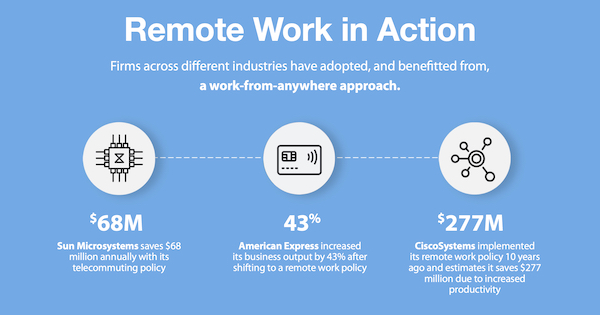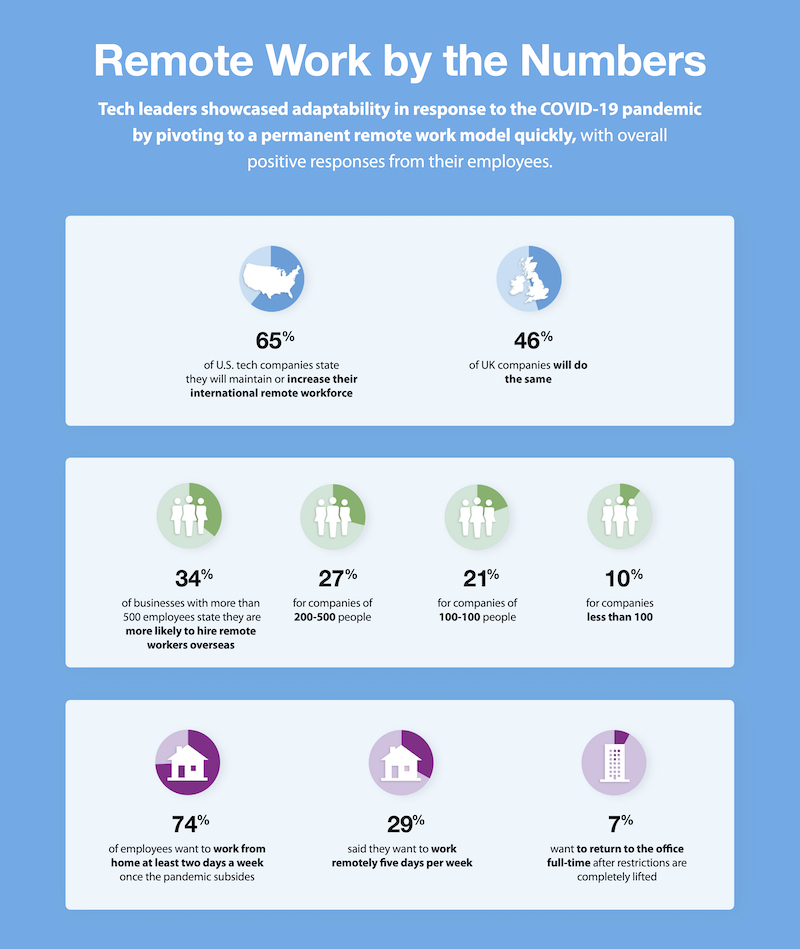Technology companies are seeking more global remote talent as a result of COVID-19, according to a recent survey from Velocity Global. Responses from 1,000 U.S. and UK tech company decision-makers revealed that 65% of U.S. tech companies and 46% of UK tech companies plan to maintain or increase their global remote workforce this year.
“The global pandemic forced the biggest workforce shift in modern history as businesses adopted remote work en masse overnight, and the changes are permanent,” said Velocity Global founder and CEO Ben Wright. “The worker fundamentally separated from the workplace, including transcending borders. Companies now use the tech tools and manage remote teams almost exclusively. The comfort level rose in 2020 and companies seek top talent around the world like never before.”

Remote Work By The Numbers
The switch to remote work in response to the pandemic inspired lasting change for tech companies to seek and employ talent outside of their headquarters or employee centers.
- Remote work at home. Tech companies immediately enabled work from home with the onset of the pandemic. With the tools in place, 61% of U.S. tech companies and 52% of UK tech companies intend to maintain or increase a domestic remote workforce.
- Scale aids global remote shift. Of the U.S. tech companies (65%) and UK tech companies (46%) with plans to maintain or increase a global remote workforce, large companies lead the charge. However, smaller companies are not far behind.
- 34% of tech businesses with more than 500 employees are more likely to hire remote workers overseas
- 27% of companies with 200-500 employees
- 21% for companies with 100-199 employees
- 10% for companies with fewer than 100 employees
“The global scale of the pandemic forced large enterprises to invest in remote work at scale, but smaller companies are positioned to accelerate the trend going forward,” said Wright. “Growth companies are built with agility to compete with larger companies in all facets of business, and these numbers indicate they must compete for top global talent. That competition forces businesses of all sizes to hire quickly and compliantly in any global market.”

Benefits Of A Remote Workforce
The shift to remote work increases productivity, supplements the bottom line, and engages employees.
- Employee preference. 74% of U.S. employees prefer to work from home at least two days per week once COVID-19 is no longer a concern, according to a PwC survey. Nearly a third (29%) prefer to work remotely five days per week. In the UK, only 7% of UK workers want to return to the office following pandemic restrictions, according to leading international research data and analytics group, UK YouGov.
- Improved productivity. More than half (52%) of executives in the PwC research report an increase in productivity for remote teams during the stress of the pandemic.
- Culturally diverse teams earn better returns. Geographically dispersed teams bring diversity of culture, race, and ethnicity. Companies that rank higher in diversity are 35% more likely to see above-average financial performance in their industries, according to longstanding research by McKinsey & Company.
- Access to skilled talent. Access to the global talent pools allows companies to hire the best candidate for the position, not the candidates closest to the office.
- Increased recruitment and retention. Remote work improves recruitment and retention for employers. A recent LiveCareer study of remote employees during the pandemic found that 62% stated that in the future they will give preference to employers who offer remote work; while 29% said they will leave their current job if they are not allowed to continue working remotely.
- Lower costs. A company can save tens of thousands of dollars annually per remote worker who telecommutes half of the time. Last year Global WorkplaceAnalytics found that companies identified real estate savings with full-time telework to equal $10,000 per employee (annually). That research points to companies like Sun Microsystems that saves $68 million annually in real estate costs due to its telecommuting policy.
“The benefits of a global remote workforce span business metrics from the employee experience to the bottom line, which go hand in hand” said Wright. “The past year introduced a widespread benefit to employees – work from anywhere. Spend more time with family or friends, save time and money on a commute, live anywhere and get a job in any market. When that benefit matches increased productivity, retention, and lower costs businesses must move quickly to implement remote teams on a global scale or risk losing talent to competitors.”
Want to read more surveys and research?
Check out all the latest surveys and research regarding workforce development, corporate relocation, corporate expansion, real estate, site selection, economic development and more.













![[VIDEO] Get More for Your Business in Ardmore. Oklahoma](https://businessfacilities.com/wp-content/uploads/2024/02/maxresdefault-324x160.jpg)
